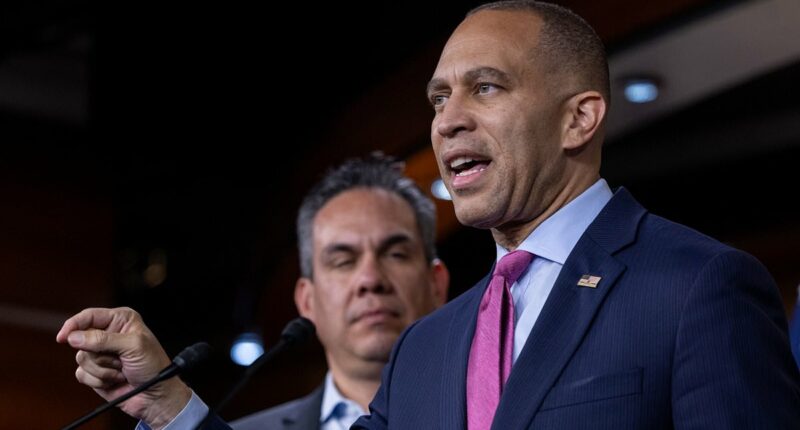Share this @internewscast.com
Across America, individuals at risk of a health crisis now face heightened threats as essential home-health services are disrupted due to the federal government shutdown.
As the debate over government funding continues, Congress has not succeeded in renewing provisions for hospital-at-home services for seniors. These programs offer seniors post-acute care at home, similar to what they would receive in a hospital setting.
The spending bill, which recently lapsed, had temporarily allowed hospital-at-home and telehealth services for seniors aged 65 and above on Medicare. Programs under organizations like the Centers for Medicare and Medicaid Services’ Acute Hospital Care at Home provide regular virtual consultations, on-site nursing, and remote monitoring for several days after an illness or surgery.
Telehealth services are also instrumental in postoperative recovery from surgeries such as joint replacements and are extensively used for ongoing conditions like diabetes and hypertension monitoring.
Last year, telehealth services assisted over 6.7 million seniors, with thousands benefiting from hospital-at-home programs within major health systems.
These vital services offer comprehensive medical care to those unable to physically visit hospitals or clinics, including daily visits from doctors and nurses, diagnostic tests, treatments like IVs and therapies, and emotional support.
Home hospitalization and telehealth programs have been a lifeline for seniors with mobility issues, financial difficulties, or those living far from hospitals.
But doctors and hospitals have been or will be forced to stop providing these services without a guarantee of payment, either upfront or retroactively, from the federal government amid the shutdown.
Due to the shutdown, Medicare’s expanded telehealth benefits expired on September 30. As a result, seniors can no longer have convenient video or phone appointments from home, unless they live in a rural area, and critical therapies, such as physical and speech therapy, are no longer covered remotely.

Mass General Brigham in Boston, one of the nation’s largest home hospital programs, is steadily winding its services down. Pictured above is Brigham and Women’s Mass General Health Care, a facility part of the Mass General Brigham system

A spokesperson from Hackensack Meridian Health confirmed to Daily Mail that it stopped admitting patients to its home-health program. Pictured above is Bayshore Medical Center in Monmouth County, New Jersey, which is part of the Hackensack Meridian Health system
Thousands of patients who rely on these programs are contending with chronic health conditions that increase their risk of suffering a health crisis such as a devastating stroke or heart attack.
Two in five seniors in Medicare have heart disease. Over a third have diabetes. Sixty-four percent have high blood pressure. And, according to the most recent data, nearly four percent have a stroke every year, often requiring hospice care as a result.
Hospital-at-home programs proliferated in 2020 when the Covid pandemic forced millions of Americans to shift their healthcare to online platforms.
They provide patients with acute-level medical care directly in their own homes. Instead of a traditional hospital stay, patients receive hospital-level services, including intravenous medications, vital sign monitoring, nursing care and virtual physician visits.
The program was initially launched using emergency waivers from the Centers for Medicare and Medicaid Services. For it to continue, Congress must periodically extend the legal authority for these waivers. However, with both parties at a stalemate, those waivers have expired.
As of October last year, approximately 31,000 seniors had utilized hospital-at-home programs for care, according to CMS, with more than 400 hospitals across 147 systems and 39 states having received waivers.

Amid the ongoing fight over funding the government, Congress has failed to extend allowances for hospital-at-home programs for seniors (stock image)
A spokesperson from Hackensack Meridian Health, one of hundreds to have a home-hospital program, confirmed to Daily Mail that it stopped admitting patients last Friday and has fully discharged its patients ‘due to the expiration of the federal Acute Hospital Care at Home waiver.’
And at University Hospitals in Cleveland, Ohio, its expansive telehealth services for Medicare enrollees, dating back to Covid, have been halted.
A spokesperson for the hospital system told Daily Mail: ‘We are working with our providers and patients to communicate this information, reschedule appointments to in-person and explain self-pay options should patients need that option.’
Mass General Brigham in Boston, one of the nation’s largest home hospital programs, is steadily winding down. Its patient count fell from 60 last week to 40 by Monday.
Broader telehealth services provide seniors with a vital link to routine and chronic healthcare from the comfort of their own living rooms.
Before the pandemic, Medicare restricted telehealth to rural patients who couldn’t travel to a medical facility, excluding those with mobility or transportation challenges. The pandemic waivers lifted these geographic restrictions, finally allowing seniors everywhere to access care from home. Waivers to give the program that flexibility have expired.
These virtual appointments enable them to conveniently manage chronic conditions, such as diabetes or hypertension, routine follow-ups with specialists, and timely consultations for minor illnesses.

Democratic House Minority Leader Hakeem Jeffries speaks during a press conference as the government shutdown continues
Advocates and organizations, such as the American Telemedicine Association and the Center for Connected Health Policy, have stated that the government shutdown will strand millions of seniors who rely on telehealth.
The loss of telehealth disproportionately impacts people in rural or underserved areas, people with disabilities and anyone relying on virtual visits to manage chronic conditions and mental health.
ATA Action, the political arm of the American Telemedicine Association, stated that the shutdown is already disrupting providers’ and patients’ care. Many providers are continuing telehealth services, hoping for retroactive reimbursement, while others are already blocking new virtual appointments.
Hospitals are absorbing costs or preparing for financial strain, and smaller clinics warn they cannot sustain care without certainty.
Across the board, providers are implementing contingency plans and notifying patients of potential out-of-pocket costs that they have never incurred before.














